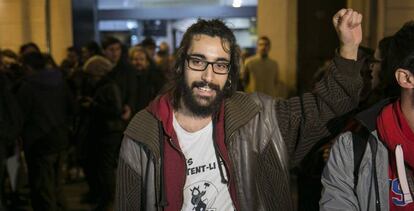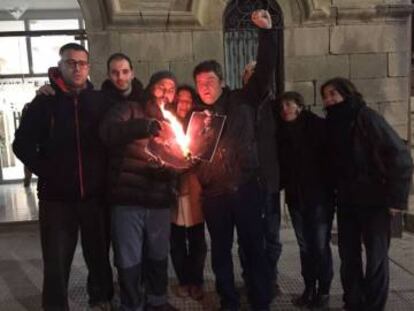Catalans who burnt photo of Spanish king released after refusing to testify
Separatist politicians arrested after ignoring summons to court hearing for crimes against crown
Five members of a far-left Catalan party were released on Tuesday after refusing to answer a judge’s questions in a case involving the burning of photographs of Spain’s King Felipe VI. The pro-independence activists were being investigated for crimes against the crown after setting photographs of the Spanish monarch on fire on September 11, when Catalonia Day is observed in the northeastern region.

The suspects refused to testify by video-conference before Spain’s High Court on December 7, saying it was their deliberate intention to disobey the judge because they did not feel they had committed a crime.
Three were arrested on Monday and taken to Madrid to appear before Judge Fernando Andreu.
It is absurd in this day and age to see people arrested for crimes of opinion
Marcelo Expósito, Podemos
The other two were detained on Tuesday morning, the date of the new hearing, as they were traveling to Madrid on a bus full of supporters.
The hearing took place at the High Court at around 1pm, when all five detainees invoked their right to remain silent. Prosecutors did not request any further legal measures against them, and all five were released.
Persecution?
The activists have sought to portray the case as political persecution for their ideas.
“We appeared before the judge to say that we will not testify in a court we do not recognize as legitimate,” said one of the detained activists, Aitor Blanc, a councilor in Santa Coloma de Gramanet. “This court is derived from the Public Order Court of the [dictator Francisco] Franco era. This is a political trial persecuting pro-independence and the sovereignty of the Catalan people.”

While the group was inside, around 30 sympathizers gathered outside the court to show their support. “No king and no fear. We will disobey!” read one sign.
Among the group of supporters was Anna Gabriel, a deputy in the regional Catalan assembly for CUP, a fringe group that espouses anti-capitalism, eco-feminism and Catalan sovereignty. The CUP’s support was critical to Catalonia’s right wing Convergència party (now renamed Catalan Democratic Party after a series of corruption scandals) following the inconclusive regional elections of September 2015.
Internal friction
But the case of the photo burning has created friction between CUP and more moderate separatists in power, particularly after the three original arrests were made by the Catalan regional police force, the Mossos d’Esquadra, on behalf of the Spanish judiciary.
“We are here because of the actions of the [Catalan] Interior Department, which decided to identify the colleagues who symbolically burnt images of the monarchy,” said Gabriel, one of the CUP’s most visible figures.
We appeared before the judge to say that we will not testify in a court we do not recognize as legitimate
Aitor Blanc, detained activist
“This kind of burning has been done on many occasions, and so it is the [Catalan] department that decided that we should be here today, wasting our time in front of this tribunal de excepción,” she added, employing an out-of-use term for a special court associated with the Franco regime in Spain.
“It is absurd in this day and age to see people arrested for crimes of opinion and for critical displays against the crown,” said Marcelo Expósito, a deputy for the leftist party Podemos in Spanish Congress.
English version by Susana Urra.
Tu suscripción se está usando en otro dispositivo
¿Quieres añadir otro usuario a tu suscripción?
Si continúas leyendo en este dispositivo, no se podrá leer en el otro.
FlechaTu suscripción se está usando en otro dispositivo y solo puedes acceder a EL PAÍS desde un dispositivo a la vez.
Si quieres compartir tu cuenta, cambia tu suscripción a la modalidad Premium, así podrás añadir otro usuario. Cada uno accederá con su propia cuenta de email, lo que os permitirá personalizar vuestra experiencia en EL PAÍS.
¿Tienes una suscripción de empresa? Accede aquí para contratar más cuentas.
En el caso de no saber quién está usando tu cuenta, te recomendamos cambiar tu contraseña aquí.
Si decides continuar compartiendo tu cuenta, este mensaje se mostrará en tu dispositivo y en el de la otra persona que está usando tu cuenta de forma indefinida, afectando a tu experiencia de lectura. Puedes consultar aquí los términos y condiciones de la suscripción digital.









































